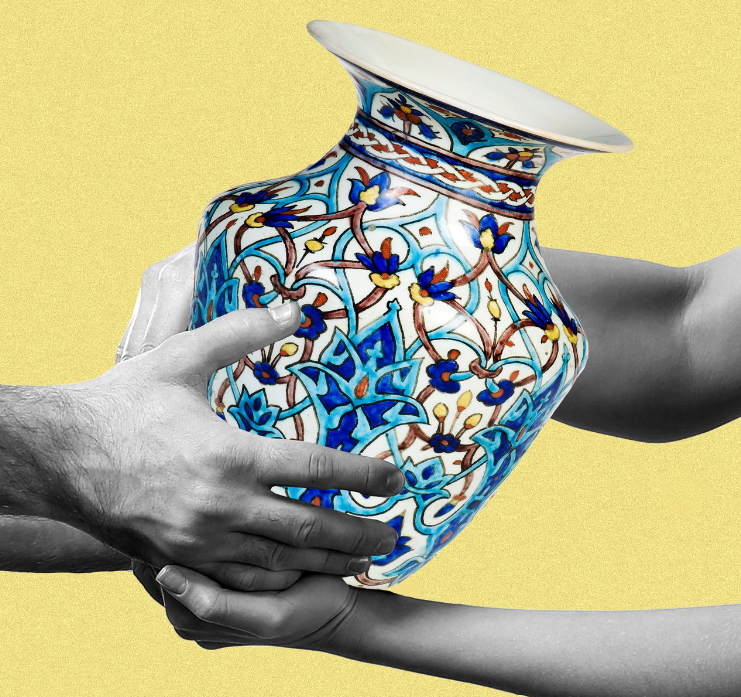
By Ashlea Ebeling
July 31, 2023
Divvying up stuff among heirs can turn into a battle, but it doesn’t have to.

PHOTO ILLUSTRATION BY ELENA SCOTTI/THE WALL STREET JOURNAL, ISTOCK (2)
There are many ways to go wrong: writing vaguely worded wills, putting sticky notes on items around the house as bequests and counting on heirs to work it out. Missteps can cost an estate thousands of dollars, and disputes over heirlooms can grow ugly, dragging out the estate process and leading to lingering resentments, say estate administrators.
Helping to clear out a high-rise apartment, David Kantrowitz, an appraiser and art dealer in Boston, found a diamond wedding ring and band in a hazardous-waste bag in the back of a closet. The apartment owner’s heirs were thrilled but couldn’t agree over who should get the find. The lawyer handling the estate drew a name from a hat to pick the winner of the set.
“Many attorneys gloss over personal property,” said Jennifer Galvagna, head of trusts, estates and tax at Bank of America Private Bank. Baby boomers handling their parents’ estates and assessing what they have amassed are having more conversations around inheritance and heirlooms, she said.
There are better—and often more creative—ways to plan and divide that can avoid family squabbles over cars, jewelry, furniture and household items.
Designate a personal representative
The person you choose to handle your estate typically distributes the personal property, so pick carefully and specify how much power they have.
“Are they going to hear everybody out and help the family move on?” said Kristin Shirahama, an estate lawyer with Bowditch & Dewey in Framingham, Mass.
Jason Sloman, a police officer in Williamsville, Ill., has been working on settling his dad’s estate for almost two years. His father, John Sloman, a large-machinery mechanic, had more than a dozen vehicles, a homemade water-well drill rig, two semitrailers of car parts and guns dating to the Civil War. The elder Sloman listed 19 heirs, including stepchildren and friends, in a trust he drew shortly before his death in 2021.
“He said, ‘I know you can handle everyone I want to help and the stress of dealing with people who aren’t going to be happy,’” Sloman said.
Spell out bequests in your will or trust
If you want a particular item to go to a certain someone, make it clear in your will or trust, Galvagna said. Describe the item in detail and include the name of the person who should get it. Just putting a sticky note on something—or telling a family member it is theirs after you are gone—doesn’t make it legally binding.
Sloman’s dad left his Buick Roadmaster with a Corvette engine to a friend who could use that engine for her hot-rod car. Another friend inherited his Ford work truck to use in his side hustle. His guns went to his son.
For the most part, Sloman’s father told him to liquidate everything, put the money in the trust and distribute it to heirs as cash.
“He knew what was precious to him might not mean anything to other people,” Sloman said.
Specify a distribution method
Paul Lyon’s parents left it to him and his sister to equally distribute everything in their estate among their children after the parents’ death in 2020. The five siblings met at their parents’ townhome in Minnesota to sort through the belongings and choose things each wanted.
For items that more than one sibling liked, the kids pulled out a deck of cards and played high card wins. “I lost at every card draw,” Lyon said, noting he lost out on a TV, a set of dishes and a drill press.
Spelling out the distribution method in the will or trust can help prevent conflicts. “Generally, children behave well when the parents have set the expectations,” Shirahama said.
Rolling dice works, too. Or drawing straws. When labeling items to distribute among heirs, keep in mind that sticky notes fall off. Color-coded stickers work better.
Get creative
In one estate, two sisters wanted the same ring that wasn’t left to anyone specifically, Galvagna said. An estate-settlement officer at the bank got a duplicate ring made, mixed it up with the original and gave one to each daughter.
In another estate, three children fought over a cookbook with handwritten notes by family members, she said. The personal representative had them draw straws. The child with the large straw got the original cookbook. The other children got photocopies.
Write a personal property memo
In most states, you can draft a memo listing what you want to give and to whom. If the memo is incorporated in a will or trust, it is legally binding. If not, the personal representative can take your wishes into consideration. Sign and date it.
Get heirlooms appraised
Families who get appraisals can use that information to decide how to divide up items equitably, what to sell and what to donate.
If the heirs don’t want stuff left to them, they can donate it and use the appraisal to substantiate a tax deduction for the donation, said Galvagna. Appraisals are also needed for estate-tax and capital-gains tax purposes.
Kantrowitz has had lots of “Antiques Roadshow”-type moments spotting overlooked valuable items and selling them for heirs at auction: a $15,000 gold cuff bracelet that a son almost threw away, a $20,000 pair of midcentury armchairs from an attic home office and a $25,000 silver-plated box on a hall shelf.
One of his latest finds: A tchotchke on a kitchen counter in an apartment of a 98-year-old man turned out to be a sculpture appraised at $4,250.
“I didn’t like it,” said the man’s daughter and heir, Marcia Brier, of Newton, Mass. She is selling it and planning to buy a pair of earrings, something meaningful to her to remember her dad by. “They’ll be from him,” she said.
Write to Ashlea Ebeling at ashlea.ebeling@wsj.com
Dow Jones & Company, Inc.



